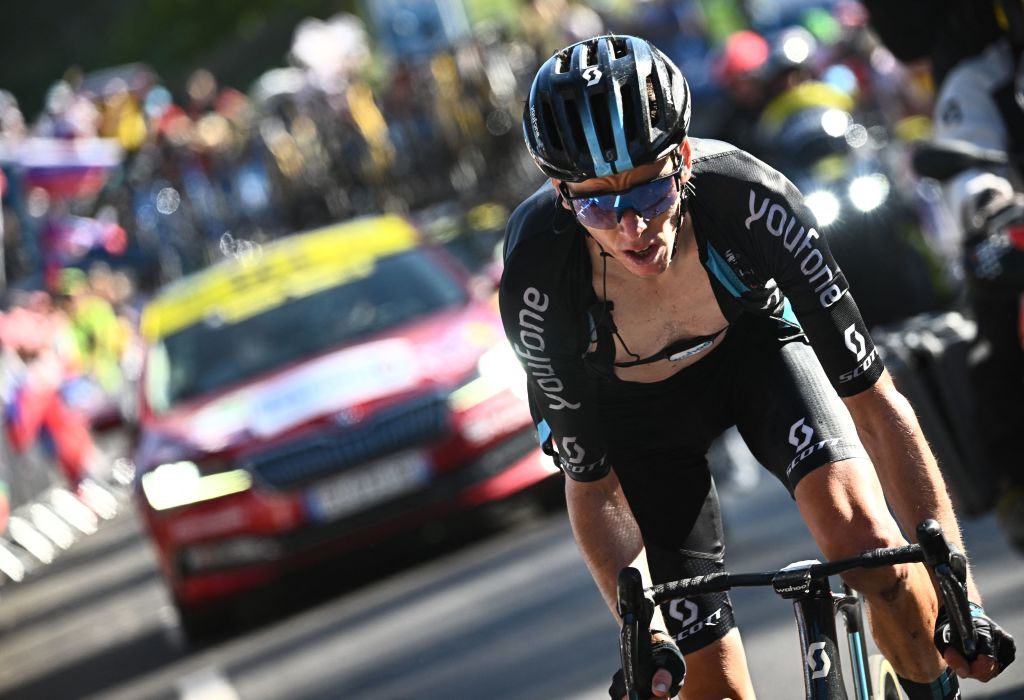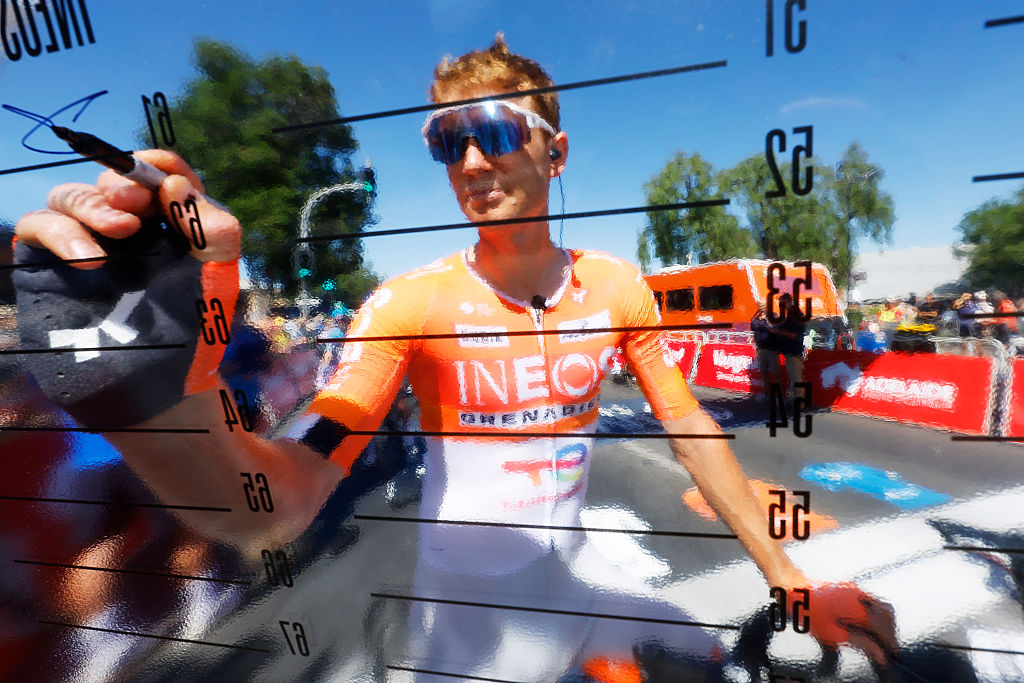Bardet: When Vingegaard and Pogacar accelerate, nobody can compete with them
Frenchman lies fourth ahead of Tour de France’s entry into Pyrenees

The latest race content, interviews, features, reviews and expert buying guides, direct to your inbox!
You are now subscribed
Your newsletter sign-up was successful
Romain Bardet smiled as he answered during Monday’s rest day press conference. What else could he say? Jonas Vingegaard and Tadej Pogačar occupy the top two places as this Tour de France enters the Pyrenees, and they have travelled to places nobody else could reach in the two weeks to this point.
“No, I don’t think so,” Bardet said when asked if he or any of the podium contenders could live with the top two in the mountains of this Tour. “We just hope they maybe look a bit at each other, because so far in the race, when they want to accelerate and make the decision, no one else can compete with them. It’s pretty hard.”
And yet Bardet has followed them further than most, and he has doggedly pieced together his finest Tour since he placed third overall after matching Chris Froome through the mountains in 2017. In May, illness forced the DSM rider to abandon a Giro d’Italia where he looked a potential winner, and he arrived at this Tour suggesting that hunting a stage win would be the summit of his ambition.
Instead, after two weeks of racing, Bardet lies fourth overall, 3:01 off Vingegaard’s yellow jersey but just 18 seconds shy of Geraint Thomas’ podium spot. He was a notable aggressor on the pivotal day to the Col du Granon, but his bid for stage victory on the final climb was drowned out by Vingegaard’s unmatchable effort on its upper reaches. He is unlikely to be afforded much more latitude in the Pyrenees.
“We’ve come a long way and made a big effort to be in such a good position. We wanted to leave all options open on the Tour and they are still open,” Bardet said. “Being this high up in the GC deprives me of opportunities to chase stages, like at Alpe d'Huez where I would have needed to be twenty minutes down overall to get in the breakaway. But I would still like to win a stage here à la pédale. Still, after a difficult beginning of the season, I’m happy to be where I am now.”
Bardet knows that he would have to rely on the providence of jours sans from both Vingegaard and Pogačar to overhaul them in the general classification. A podium place would appear the obvious glass ceiling in the final week of this Tour, even if he struck an optimistic note about escaping their attention to snare a stage win. Peyragudes features on stage 17, after all, and Bardet won there in 2017 after distancing Froome himself in the final kilometre.
“It's a great memory, because I wasn’t super all day, but I found an opportunity in the finale,” Bardet said. “It’s similar situation here. When Vingegaard and Pogačar accelerate, I’m on the limit, but if you can hang tough, there might be a chance to win the stage. Maybe I can anticipate them if I have the energy. I already attacked on the Granon, and maybe my chance to win a stage could come like that.”
The latest race content, interviews, features, reviews and expert buying guides, direct to your inbox!
As well as withstanding Vingegaard and Pogačar’s inevitable Pyrenean duel, Bardet must also juggle the double threat of Ineos’ Thomas and Adam Yates, currently third and fifth in the overall standings. If Bardet is to claim the third podium finish of his Tour career, he will need to amass a buffer over Thomas ahead of the penultimate time trial on Saturday.
“Ineos have two strong options in the top five, and I’m not sure if they would be happy with the current situation in Paris because they have already won the Tour so many times,” Bardet said. “At some point, they will risk something with one of those two guys. They’re looking good and super consistent, so I think they will also try to shake up things a bit. I hope to have the legs to follow them.”
Home drought
Bardet and David Gaudu (Groupama-FDJ), who currently lies 8th at 4:24, are shouldering French hopes on this Tour. A first overall victory since Bernard Hinault in 1985 felt unlikely even before a pedal was turned in anger, but the host nation now risks going an entire Tour without a stage win for only the third time in history and the first time in the 21st century. France’s last stage win on the Tour came on the opening day in 2021, when Julian Alaphilippe won in Landerneau.
“There are fewer and fewer stages for baroudeurs, we don’t have Julian Alaphilippe here for punchy stages or a real sprinter like Arnaud Démare, and Gaudu and I are finding it hard to go for stages because we’re up there on GC,” Bardet said. “But this is the highest level you can find in cycling, and that makes it harder to win. There are still six days left, and I think there’ll be opportunities, but it will be complicated too.
“But it’s harder to go for GC here than it is to win a stage. Finishing in the top 7 or 8 at the Tour is really underrated because the effort you have to make to be at that level is immense. It’s not one shot out of 21 stages; it’s 21 stages where you have to be at your best.”
France last went an entire Tour without a stage win in 1999, in an era when French riders felt themselves the victims of cyclisme à deux vitesses due to the more stringent anti-doping requirements enacted there in the aftermath of the Festina Affair. Two decades later, the spectre of two-speed cycling has not dissipated. Last year, Bardet joined compatriots and fellow MPCC members Thibaut Pinot and Guillaume Martin in expressing concerns about the exploitation of grey areas in the form of therapeutic use exemptions and ketones.
“I just keep doing what I’m doing, with our line at the team. Right now, I don’t care about what the others are doing,” Bardet said on Monday. “Cycling is hard enough in itself. Especially in the third week of the Tour, you don’t want to lose your mind thinking about other stuff like this. It was something we spoke about over the last years, but I don’t know exactly how it’s evolved since then. I’m just trying to keep focused on what we are doing.”

Barry Ryan was Head of Features at Cyclingnews. He has covered professional cycling since 2010, reporting from the Tour de France, Giro d’Italia and events from Argentina to Japan. His writing has appeared in The Independent, Procycling and Cycling Plus. He is the author of The Ascent: Sean Kelly, Stephen Roche and the Rise of Irish Cycling’s Golden Generation, published by Gill Books.
